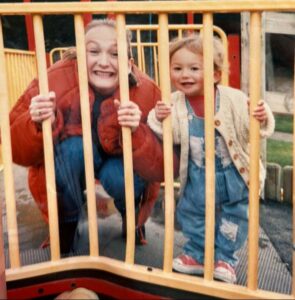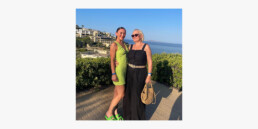A guest blog by Sarah Hussey.
The day that Holly got her ADHD diagnosis was bittersweet to say the least. She was 28 years old and we were in the Psychiatrist’s office together after an intensive assessment process that went from her early years right up to the present day. We had arrived at the place together after Holly had admitted being really struggling (not for the first time) with life in general and had returned to significant self-harming. This diagnosis has changed our outlook on life but would have been far more useful 15 years ago. I doubt very much that she would have been diagnosed before her teenage years. As her mother I felt both relief that we had finally got there and guilt that it had taken so long. As an educator all I could think was ‘how the F**K did I not put two and two together and make four’. And therein lies the problem for women with late diagnosis ADHD; all the health and education professionals involved with you over the years (and sometimes your own family) put two and two together and make five, six or even seven – but never four!
When I began teaching in 2000, ADHD was something that only boys were diagnosed with, and often it was thought that chaotic/negative parenting played a central role (nonsense of course!) These boys were often impulsive, loud and caused daily disruption in your class, and this is still very much how it presents in boys today. Thank god we are better educated now but I wonder how many girls in my classes were struggling with ADHD, but because it presents so differently in females are now only getting the support they need?
In Holly’s early life there were factors that would not have led you to an ADHD diagnosis initially; she had a traumatic birth which led to her being in NICU and the first nine years of her life was spent in a home where domestic violence and alcohol and drug abuse was the norm – something we have all taken a long time to process and accept.
As a baby she never slept for longer than two hours, night or day! I did not know whether I was coming or going for the first two years of her life. She slept with me every night and only managed one night in her cot, and she screamed herself to sleep whilst I cried (the health visitor said I had to be tough!) Incidentally, when her sister was born three years later, she slept through the night at ten days old. I had to keep checking that she was breathing!

Holly was a curious child, her speech was great and she read at an early age – her love of books came from her maternal Grandma. She loved to learn and could retain so many facts and figures about things that she was interested in – if she wasn’t interested, forget it! She liked to please at school and was compliant and followed the rules. At home, she was a live wire, she wanted to do everything. At one stage in her school life we were running her to events every night of the week and at weekends. She played football, cricket, netball and she was part of an athletics club and ran long distances competitively. She rode horses, and surfed and swam – in fact she swam the Solent! She still runs most days and has competed in marathons and triathlons. Once she began High School at 13, she joined the gym and went twice a day most days. She was also very academic and took her studies very seriously. It was also obvious that she struggled with relationships with others and her own view of herself. We really struggled to understand how her mind worked – not long ago she told me that her head was ‘so loud.’
During her teenage years Holly struggled with her mental health – she lost a lot of weight and was not eating anywhere near enough to fuel the daily exercise she was undertaking. She was diagnosed with Anorexia and referred to CAMHS. Over the years there have been many suggestions and diagnoses from various professionals – Anxiety, Depression, Bi-Polar Disorder and Anorexia have all been attached to Holly and all with different treatments including medication. None of these ever seemed to make things any more understandable or manageable for her or the rest of the family. Then it was time for university, and this is when she really began to unravel. Managing life was too difficult for her and she was completely overwhelmed all the time and like so many young women in her position she self-medicated with whatever helped her at the time. Believe it or not, despite how hard it was and still is, she has a nursing degree and is now training to be a doctor. Her resilience astounds me.
Holly is one of many young women who have been wrongly diagnosed for years. It is a sound argument that it is because we knew less about ADHD in women 10 or 15 years ago – but we know now and have to do better! For a start, waiting lists are so long on the NHS you may as well give up before you even start – we were lucky enough to have family support us to go through the assessment privately. However, this in itself comes with the fact that some people think that if you pay for a diagnosis then of course you will get it! (I don’t think any of us, including Holly, wanted her to have ADHD). Educators need training to recognise the signs of ADHD in girls so they won’t have to struggle for so long. Research now shows that if young people are safely medicated earlier on in life, they will be less likely to use drugs/alcohol/sex/crime to self-medicate – surely this is what we want for our young people?
Holly does take medication to help the symptoms of her ADHD – it took a while to get the dosage right and for her to accept the side-effects, which are not pleasant. She can choose when she can have a break from them and knows that they do not mix with alcohol – she hasn’t drunk for months. We have both been on a journey and have read lots of books together and researched how ADHD is different between males and females. As a mum, I hope that I understand her better and try very hard not to let things that would have annoyed me before worry me – like the inability to see any of the mess she creates around herself or the difficulties she has when plans change. I sincerely hope that she understands herself better and accepts that there are some things in life that she will always find hard. The one thing that the Psychiatrist said that has stuck with me, is that he was utterly amazed that Holly has succeeded with so many things in her life considering the significant impact ADHD has on people. (I do intend to follow up this blog with others about ADHD and how it presents in females, but if I continue writing now it will become the first chapter of a book and not a blog!)
I have written this with Holly’s blessing and I am hoping that she is also going to write a blog telling us all what it is like for her.
I am incredibly proud of how she has survived this journey and is now beginning to thrive – it has been a hard road for her and everyone that loves her and I am grateful to you all for showing her patience and understanding.
Incidentally, ADHD is thought to be genetic and the more I have learned about it and myself the more I believe that I too have ADHD. I have been referred for an assessment by my wonderful therapist but on the NHS – I am in no hurry as I have managed it for this long. People often comment on how alike Holly and I are in many ways, so ADHD will become something else that we share.



You go girls. It’s an exhausting journey I wish you both well. X
Dear Sarah and Holly. Your resilience shines through and your willingness to share your experiences will help so many peole with their own struggles. I wish you well and hope the onward journey is going to be easier – you deserve a happy ending! x
I already thought I was amazed by the women in your family, but I am even more so now. What amazing women you are!